Did you know that choosing the right companion plants for your onions can be crucial for maximizing your garden’s yields? Companion planting is an organic gardening technique that has gained popularity among gardeners and farmers, and selecting the right onion companions is key to achieving your gardening goals. Whether you want to enhance flavor, reduce pests, or increase your harvest, planting the right crops alongside your onions can make a significant difference.
When it comes to gardening with onions, their scent is a powerful tool. Onions have the ability to repel pests due to their strong aroma, making them an excellent companion for many other plants. Some examples of good onion companions include beans, strawberries, herbs like mint and parsley, and members of the brassica family. These companion plants can enhance the growth and health of your onions, creating a beneficial ecosystem in your garden bed.
Key Takeaways:
- Choosing the right companion plants for onions is crucial for maximizing yields in your garden.
- Onions have a strong scent that repels pests, making them a valuable companion for many other plants.
- Good onion companion plants include beans, strawberries, herbs like mint and parsley, and brassicas.
- Companion planting creates a beneficial ecosystem in your garden bed, enhancing the growth and health of your onions.
- Selecting the right onion companions can help improve flavor, reduce pests, and increase your harvest.
The Benefits of Companion Planting
Companion planting is an organic gardening technique that has been used for centuries. It involves planting different crops together to support and benefit each other’s growth. This strategy is gaining popularity as more gardeners and farmers shift towards more natural and sustainable practices, moving away from artificial fertilizers and pesticides.
Companion planting offers a range of benefits that contribute to maximum yields and a healthier garden ecosystem. By practicing companion planting, you can:
- Improve the taste of your food: Certain companion plants can enhance the flavor of your onions and other crops.
- Reduce pest problems: Some companion plants naturally deter pests, reducing the need for chemical pesticides.
- Improve nutrient sharing: Companion plants that have different root systems can help maximize nutrient availability in the soil.
- Enhance plant structure: Some companion plants provide natural support and shade to your onions, creating a more stable growth environment.
- Suppress weeds: Intercropping with companion plants can help smother weeds and reduce competition for resources.
- Retain moisture: Certain companion plants can help create a microclimate that retains water, ensuring your crops stay hydrated.
When companion planting with onions, it’s important to identify the specific problems you want to address in your garden in order to select the right companion plants. Whether it’s enhancing flavor, controlling pests, or improving nutrient availability, companion planting offers a natural and effective solution.
Here’s a quote from a gardening expert:
“Companion planting is like creating a harmonious community in your garden. Each plant has its role to play, and together, they thrive and support each other’s growth.”
– Emma Smith, Master Gardener
In the next section, we will explore the different companion plants that work well with onions and how they can benefit your garden.
Growing Onions and Onion Sets
Growing onions from seeds can be a bit challenging, especially for novice gardeners. But fear not! There’s an easier way to get started with growing onions: using onion sets. Onion sets are baby onion bulbs that have already sprouted and will develop into full-sized onions. They are a quick-growing plant that can save you time and effort in the garden.
To grow onions from onion sets, follow these simple steps:
- Choose a sunny spot in your garden with well-drained soil.
- Prepare the soil by removing any weeds and loosening it with a garden fork or tiller.
- Plant the onion sets about 1 inch deep and 4 inches apart, with the pointed side facing up.
- Water the onion sets thoroughly after planting to help settle the soil.
- Maintain consistent moisture in the soil, but be careful not to overwater.
- Keep the onion bed weed-free to prevent competition for nutrients.
- Harvest the onions once they have reached their desired size and the tops have started to yellow and fall over.
Companion planting is another great technique to consider when growing onions. By choosing the right companion plants, you can enhance the growth and flavor of your onions while also benefiting other plants in your garden. Onion sets, in particular, are ideal for companion planting due to their quick growth and ability to establish strong root systems.
When it comes to sprouted onions, they can provide additional benefits when planted in your garden. Sprouted onions have already begun to grow and develop roots, which can give them a head start in establishing themselves in the garden. As a result, they may grow more vigorously and produce larger bulbs than onions started from sets or seeds.
If you’re using sprouted onions, simply follow the same planting process as you would with onion sets. Ensure that you plant them with the sprouted side facing up and give them proper care, including adequate water and weed control.
So, whether you choose onion sets or sprouted onions, growing onions can be a rewarding experience for any gardener. They’re a versatile vegetable that can be enjoyed fresh or stored for future use. With the right companion plants and proper care, you’ll be on your way to a successful onion harvest in no time!
Onion Companion Plants for Pest Control
Onions and other members of the allium family are effective at repelling or deterring pests in the garden. Planting onions near crops like cabbage, broccoli, kale, and cauliflower can help repel pests like cabbage worms, cabbage loopers, and cabbage maggots.
Onions are also beneficial when planted near tomatoes, lettuce, strawberries, and peppers, as they can deter pests such as Japanese beetles, carrot fly, and aphids. Onions can also deter spider mites, which can cause damage to plants like tomatoes and peppers. Companion planting onions with these crops can significantly reduce pest issues.
Protecting Your Crops from Japanese Beetles
If you’re dealing with a Japanese beetle infestation in your garden, planting onions near susceptible plants like roses and grapes can help repel these destructive pests. The strong scent of onions can deter Japanese beetles and prevent them from causing damage to your favorite plants.
Warding off Carrot Flies with Onions
Carrot flies can be a real nuisance for carrot growers, as they lay their eggs near carrot plants, resulting in damaged roots. By planting onions nearby, you can confuse the carrot flies and make it more difficult for them to locate your carrot plants, reducing the risk of infestation.
Keeping Cabbage Worms at Bay
Cabbage worms can wreak havoc on your cabbage, broccoli, and other brassica crops. By interplanting onions with these vegetables, you can naturally repel cabbage worms and prevent them from munching on your crops. The pungent aroma of onions acts as a deterrent and can help protect your brassicas from infestation.
Repelling Aphids and Spider Mites
Onions can also play a role in controlling aphids and spider mites. These tiny pests can damage a wide range of plants, including tomatoes and peppers. By planting onions near these susceptible crops, you can repel these pests and minimize the risk of infestation, promoting healthier plant growth.
Onion Companion Plants for Nutrient Sharing
Onions can be valuable companions to crops that have different nutrient requirements and levels of soil feeding. When intercropped with root crops like carrots, spinach, and lettuce, onions contribute to efficient nutrient sharing in the garden bed.
Carrots, known for their deep taproots, access nutrients from the lower layers of soil. Onions, on the other hand, draw nutrients from the top few inches of soil. By planting these vegetables together, they can coexist harmoniously without competing for nutrients.
Lettuce and spinach, being shallow-rooted crops, complement onions well in terms of nutrient sharing. The onions draw from the top layers of soil, while lettuce and spinach can access nutrients from slightly deeper levels. Together, they create a stair-stepped series of root growth, optimizing nutrient utilization throughout the soil.
Benefits of Onion Companion Plants for Nutrient Sharing:
- Promote efficient nutrient distribution in the soil.
- Enable deep-rooted crops like carrots to access nutrients from lower soil layers.
- Optimize nutrient utilization and availability for shallow-rooted crops like spinach and lettuce.
- Support healthy growth and development of all intercropped plants.
Intercropping onions with root crops like carrots, spinach, and lettuce ensures that each plant gets the nutrients it needs for optimal growth and productivity. This symbiotic relationship results in healthier and more bountiful vegetable harvests.
Herb Companions for Onions
When it comes to enhancing the flavor of your onions, incorporating herb companions can make a significant difference. Herbs like summer savory, marjoram, rosemary, and dill are well-known for their ability to enhance the taste of onions. By planting these herbs near your onions, you can create a harmonious flavor profile that will elevate your culinary creations.
Mint and parsley also complement the flavor of onions and can be excellent additions to your garden bed. However, it’s important to exercise caution with mint, as it has a tendency to become invasive and overtake other plants in the vicinity. To prevent this, consider planting mint in a separate container to control its growth.
In addition to flavor enhancement, herbs like chamomile can bring additional benefits to your onion crop. Chamomile is known for its ability to prevent fungal issues and attract beneficial insects that feed on pests like aphids. By including chamomile in your garden alongside onions, you can create a more resilient and pest-resistant environment.
Flower Companions for Onions
Flowers can play a crucial role as companion plants for onions, providing not only aesthetic appeal but also pest control benefits. By strategically selecting the right flowers to grow alongside onions, you can create a harmonious garden that keeps pests at bay and promotes healthy onion growth.
One flower that works exceptionally well as an onion companion is marigold. These vibrant beauties not only add a pop of color to your garden but also help suppress nematodes in the soil. Nematodes are microscopic pests that can cause damage to the roots of onion plants. By planting marigolds near your onions, you create a natural barrier that protects them from nematode damage.
Nasturtiums, another wonderful flower companion for onions, can serve as trap crops. These pretty flowers attract pests like aphids away from your onion plants, luring them with their vibrant colors and enticing fragrance. By diverting the attention of aphids towards nasturtiums, you can prevent these pests from bothering your onions.
Yarrow is an attractive flower that has numerous benefits when planted with onions. Not only does it add beauty to your garden with its delicate blooms, but it also attracts beneficial insects like lacewings. Lacewings are natural predators of aphids, which can be a common problem for onions. By planting yarrow near your onions, you invite lacewings to your garden, creating a natural pest control system.
While roses are primarily grown for their ornamental value, they can also provide benefits to onions when planted nearby. Onions release a scent that repels sap-sucking pests like aphids. By having roses as companions for your onions, you can amplify this effect and further deter pests. Additionally, the combination of fragrant roses and aromatic onions can create a delightful sensory experience in your garden.
To summarize, flowers are not just pretty additions to your garden; they can also serve as valuable companions for onions. Marigolds protect onions from nematode damage, nasturtiums divert pests away from onions, yarrow attracts beneficial insects, and roses add beauty while repelling sap-sucking pests. By incorporating these flower companions into your garden, you can create a visually stunning and pest-resistant environment for your onions to thrive.
Flower Companions for Onions
| Flower | Benefits |
|---|---|
| Marigolds | Suppress nematodes in the soil and protect onions from nematode damage |
| Nasturtiums | Attract pests like aphids away from onions, serving as trap crops |
| Yarrow | Attract beneficial insects like lacewings that feed on aphids |
| Roses | Repel sap-sucking pests and add beauty to the garden |
Plants to Avoid Planting with Onions
While onions have beneficial companion plants that enhance their growth and repel pests, there are certain plants that should be avoided when planting onions in your garden. These plants can either compete for soil nutrients, attract pests, hinder onion growth, or negatively impact the flavor of other crops. Here are the plants to steer clear of when cultivating onions:
1. Legumes
Legumes such as peas, beans, and asparagus should not be planted alongside onions. These plants have similar nutrient requirements and can compete for soil nutrients, leading to stunted growth and reduced yields for both crops.
2. Allium Family Members
Members of the allium family, including garlic, leeks, and chives, should be kept away from onions. While these plants share the same family, planting them in close proximity can increase the risk of pest infestations, as pests that attack one allium crop may spread to the others.
3. Sage
Sage is not a suitable companion for onions. It has the potential to stunt onion growth and impede their overall development. To ensure the best results, it’s recommended to keep sage and onions separate in your garden.
4. Turnips
Planting turnips near onions can negatively affect the flavor of the turnips. The pungent aroma of onions can overpower the delicate flavor of turnips, resulting in a less enjoyable eating experience. Hence, it’s advisable to avoid growing turnips in close proximity to onions.
By avoiding these plants when planning your onion garden, you can ensure optimal growth and flavor for your onions, while also promoting the health and productivity of other crops in your garden.
Note: The image above illustrates the plants that should be avoided when planting onions. It highlights the potential negative interactions between certain plants and onions in a visually engaging manner.
Conclusion
Choosing the right companion plants for onions is essential for creating a thriving garden ecosystem. By incorporating optimal planting combinations, you can maximize the benefits of companion planting and promote healthy plant interactions.
When selecting companion plants for onions, consider including members of the allium family, brassicas, root crops, tomatoes, peppers, herbs, flowers, and even fruit trees. These plants can enhance the growth and flavor of onions, while helping to repel pests and improve nutrient sharing.
However, it’s important to avoid planting certain plants with onions. Legumes, other alliums, sage, and turnips should be kept away, as they can interfere with the growth of onions or negatively impact their flavor.
By implementing polyculture planting techniques and carefully considering the interactions between different plant species, you can create a diverse and harmonious garden ecosystem where plants thrive together. This holistic approach to gardening not only benefits the health and productivity of your onion plants, but also supports the overall well-being of your garden.

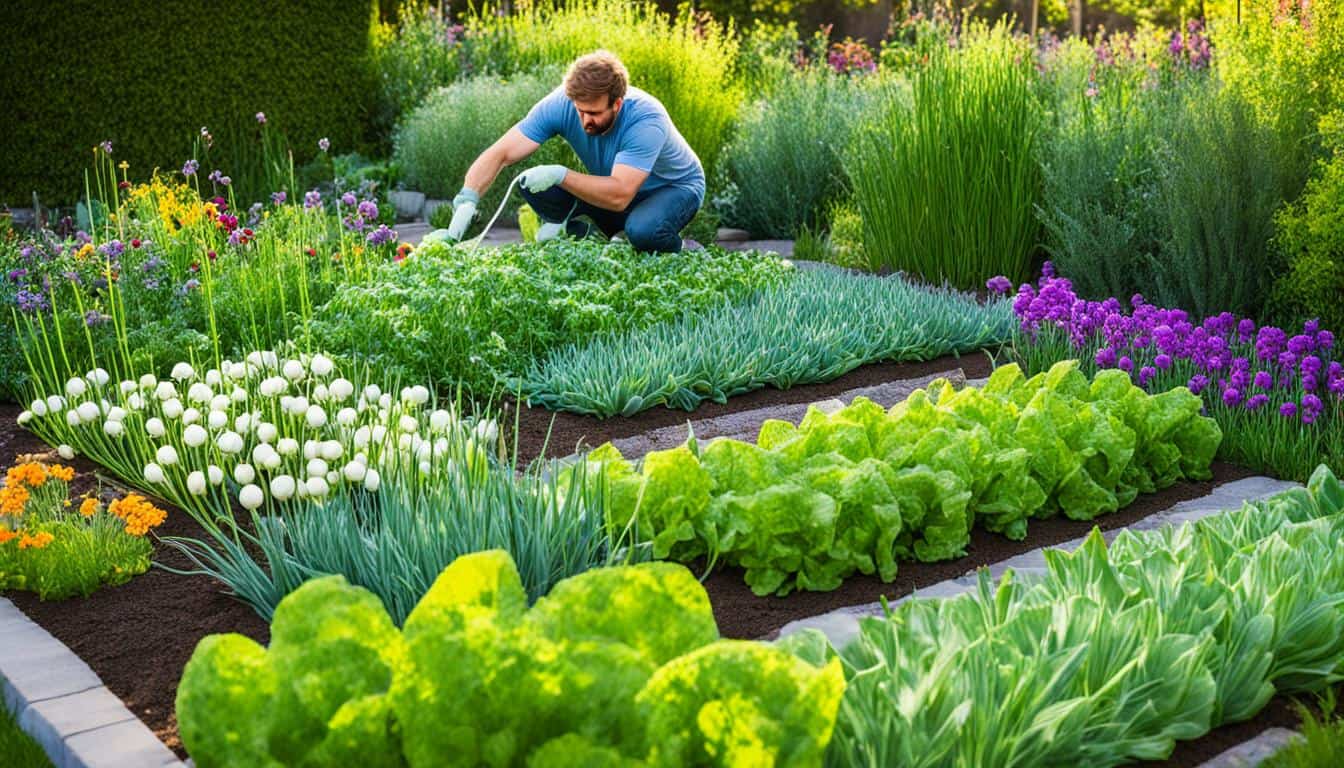
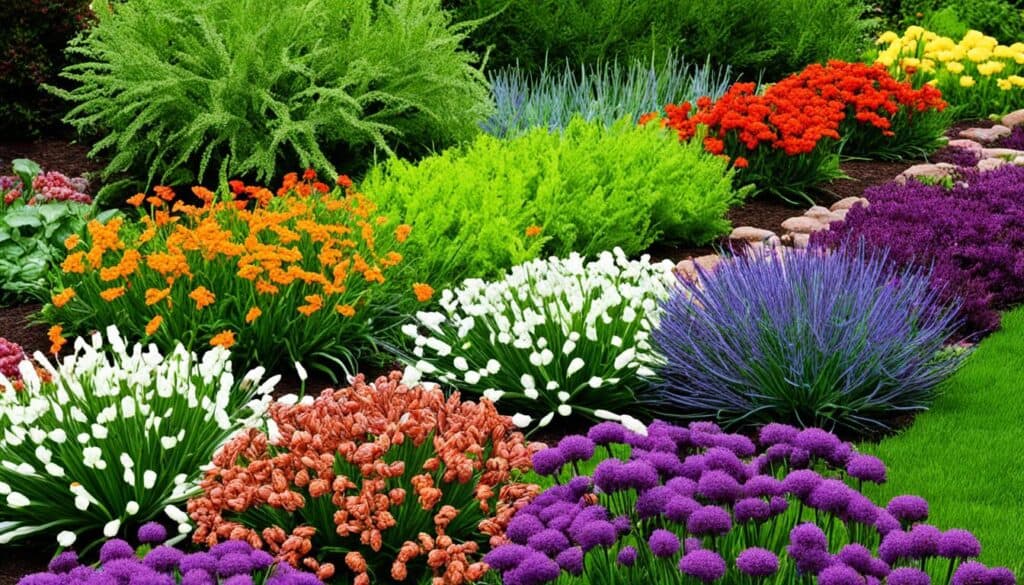
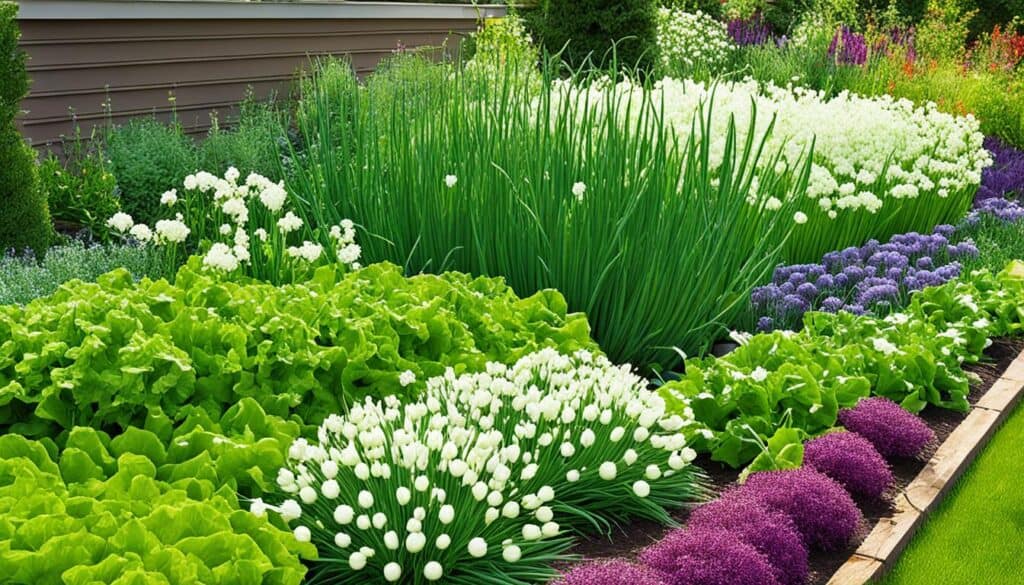
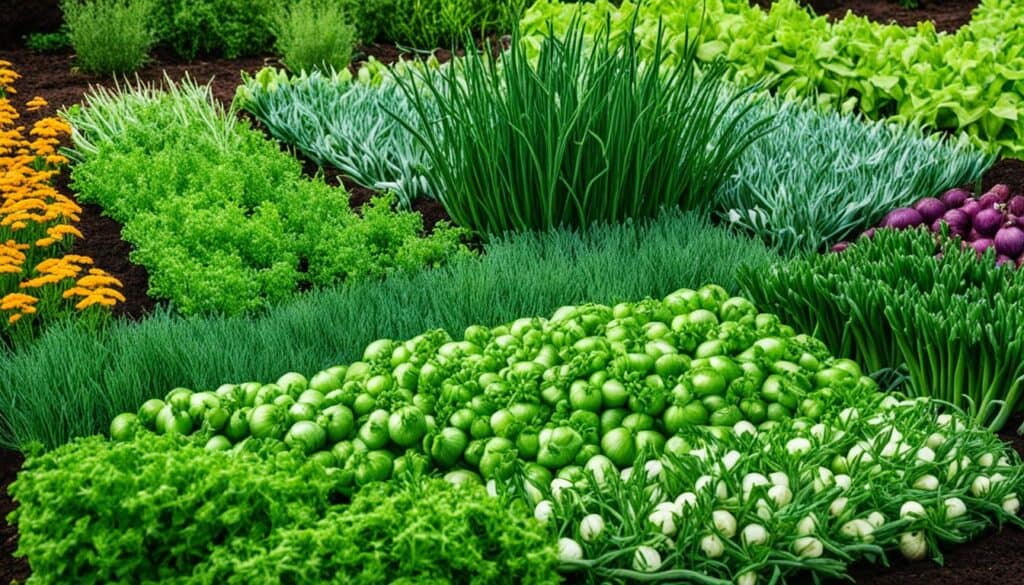
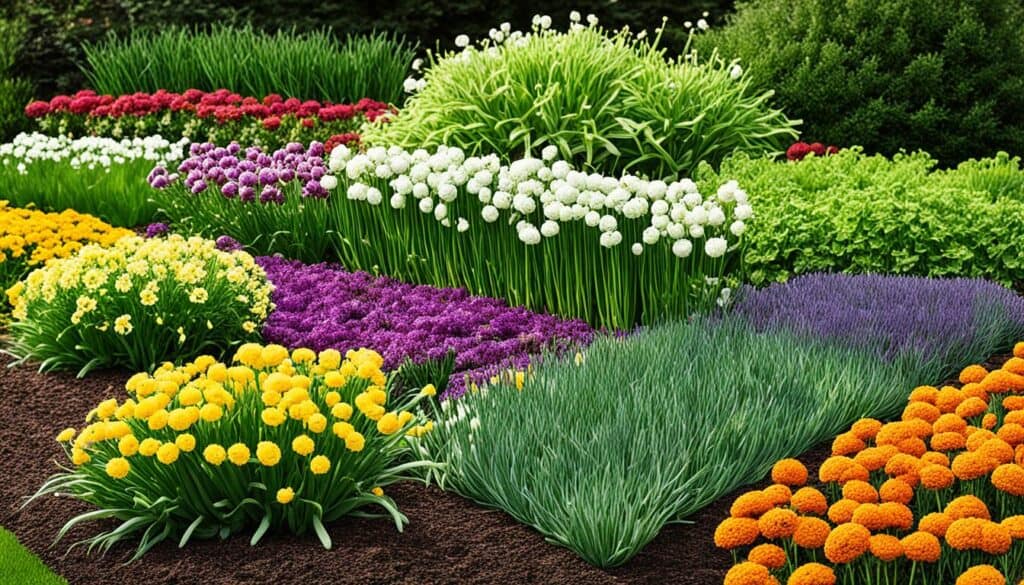
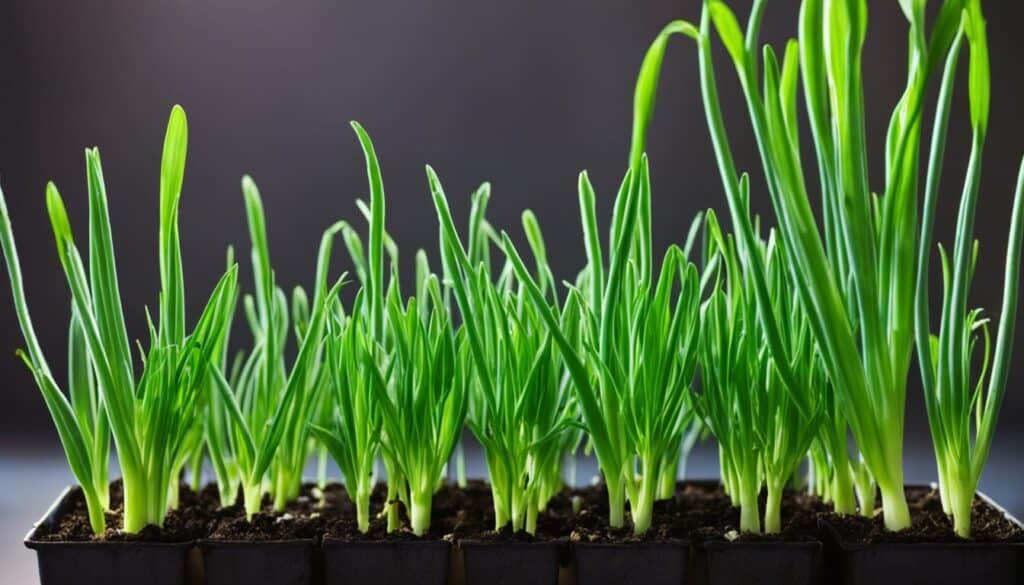



Leave a Reply